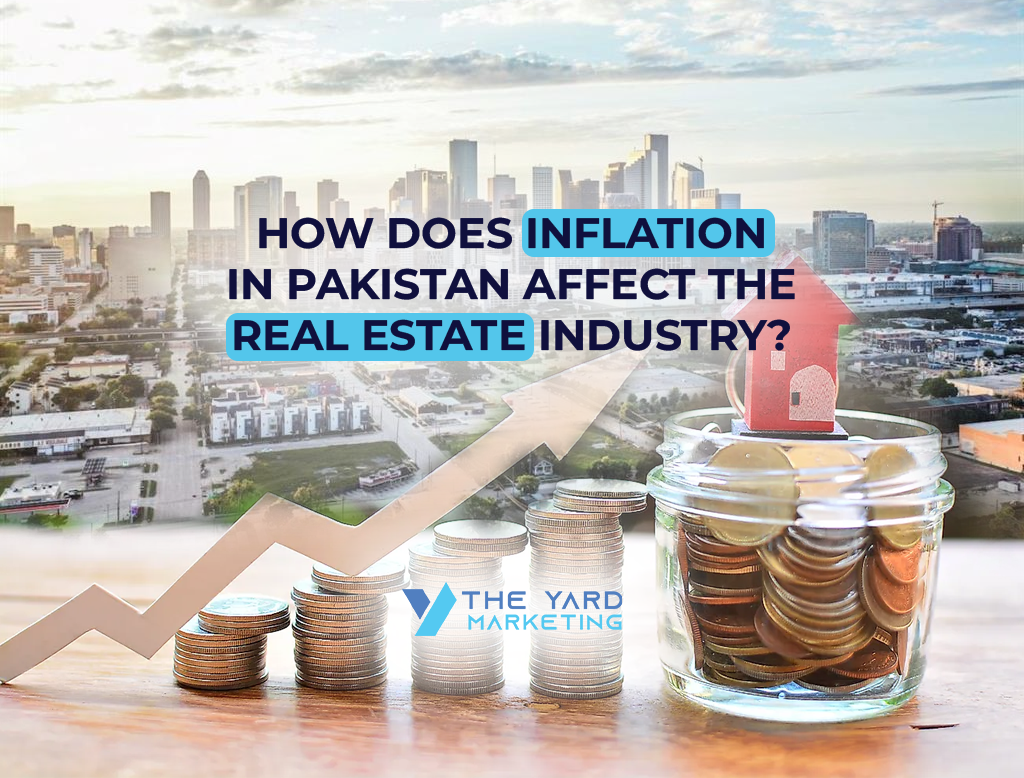Inflation in Pakistan is a significant economic factor affecting various economic sectors, including the real estate industry. Pakistan is caught up in the worst economic crisis, featuring an all-time high inflation percentage. The reason is the poor economic policies of the past. This policies have brought the country to the brink of default and economic collapse.
Besides other essentials, the country’s real estate housing market is nowhere behind in being impacted by the price hike. The rates of land, flats, apartments, homes, and farmhouses have increased substantially. Inflation in any country has pros and cons for the real estate sector of that country. Let us look at the positive and negative effects of inflation on Pakistan’s real estate housing market.
Table of Contents
ToggleWhat is Inflation?
Inflation refers to a reduction in the purchasing power of individuals due to the general increase in the rates of products and services. As Inflation in Pakistan starts to grow higher, your money loses its worth, impacting your spending value. Hence, we can describe inflation as the rate of change in those prices over time.
What Are The Causes Of Inflation In Pakistan?
According to the IMF, inflation in underdeveloped countries is anticipated to average 11.5% this year and 7.5% in wealthy countries. This global jump in inflation can be attributed to various variables, but the primary ones are the Ukrainian conflict and global supply chain disruptions. These two variables have caused global yearly inflation to reach its highest level since 1981.
In Pakistan, however, the situation is different since numerous overlapping variables work in this dramatic spike in inflation, particularly the balance of payment (BOP) problem. The government had just one option: request IMF assistance to address this. However, the IMF has yet to approve the country’s loan tranche.
How Inflation In Pakistan Affects The Real Estate Market?
Inflation in Pakistan has a direct impact on property prices. As the price level of products and services increases, the cost of construction materials, labour, and other inputs necessary for real estate development also rises. This, in turn, leads to an upward pressure on property prices, making it more expensive for individuals and businesses to purchase or invest in real estate.
Inflation destroys the purchasing power of individuals and businesses by decreasing the value of money. The same amount of money can buy less products and services as the general price level increases. This reduced purchasing power affects potential buyers in the real estate market, making it more challenging for them to afford properties or make investments. Consequently, demand for real estate may decrease, causing a slowdown in the industry.
Property Appreciation
When we look at property data from the last few years, we see that the value of the properties has increased dramatically. If we assume this increase in property value and compare it to inflation data, we can see that any real estate investment would have handily outperformed inflation.
However, you must be cautious while investing in real estate because you do not want to waste money on properties that may not provide greater returns. It is crucial to highlight that real estate investing could perform better in the short term because the property’s worth needs time to increase. You must retain the properties for some time to earn favorable long-term returns.
Increase in rents
Like other property prices, rental rates also tend to increase with rising Inflation in Pakistan. This happens due to the rise in the demand for rental properties, as there is a reduction in the buying power of people. Regardless of the currency’s value and inflation rate, property owners with rental income can pay for the increase in expenses.

Negative things that Inflation does to Real Estate
Following are the negative effects of real estate due to Inflation in Pakistan.
Building costs are going up
The rising costs of all construction materials, such as bricks, cement, steel, and so on, harm real estate. These materials’ prices rise in lockstep with inflation, leading the cost of constructing a house or building to skyrocket.
Increasing cost of borrowing
When inflation rises, most banks raise interest rates. This impacts the cost of borrowing for those wishing to finance a real estate acquisition. Building a new home in an inflationary environment will be tough due to increased borrowing and construction expenses.
Inflationary Real Estate Investments
While real estate investments are market-dependent, a few assets outperform others, particularly rental properties. These include residential and commercial properties, expected to increase demand and returns despite global inflation.
You can also invest in Kingdom Valley, Blue World City, Park View City, and Capital Smart City, which are fantastic methods to spread your money across multiple assets.
While real estate investments shield you from Inflation in Pakistan, it is important to note that they are not a short-term plan. You must plan for the long term because home prices will only rise after 4 to 5 years.
The Bottom Line!
Inflation in Pakistan has a profound impact on the real estate industry. Rising property prices, reduced purchasing power, fluctuating rental rates, and altered investment patterns are all consequences of Pakistan’s real estate housing market.
